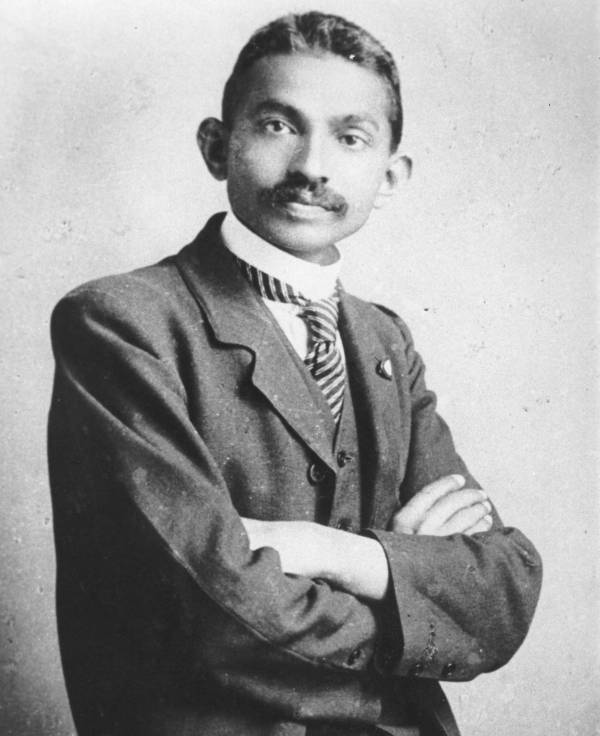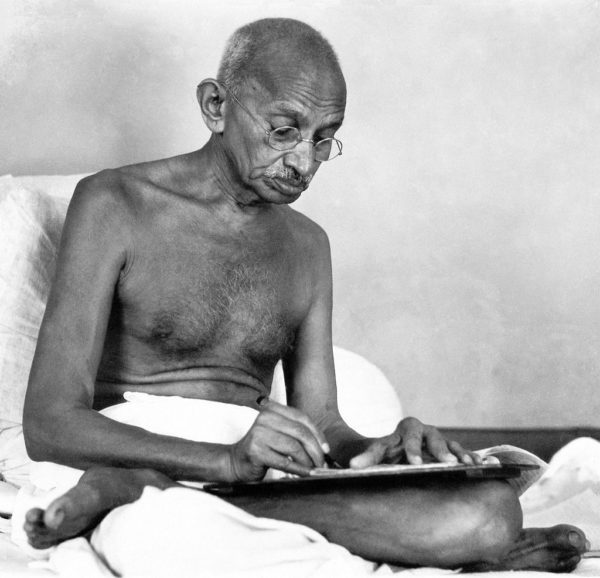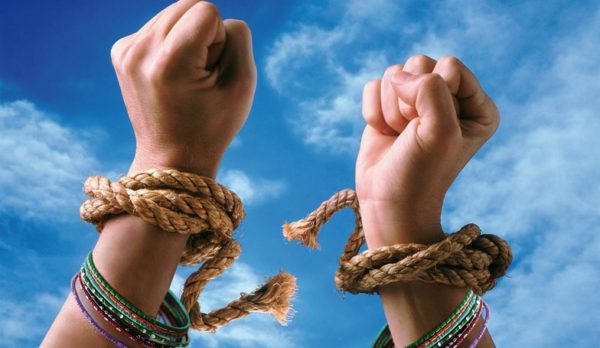I’m so excited about the upcoming Channeling Erik event in San Diego this Friday through Sunday! It’s still not too late to sign up. Again, for those of you who need a female roommate, please contact me by email (emedhus@gmail.com).
Still waiting to hear about the Yahoo Women Who Shine results. The lack of email communication probably means I didn’t win, but that’s okay. I appreciate your efforts and am grateful for the nomination!
Please welcome Mahatma Gandhi back for his encore:
Me: Okay. How did you come upon or into the nonviolent means of civil disobedience, and how did you distinguish this from any other form of aggression? After all, isn’t it passive aggression?
Jamie (laughing): He’s laughing! He said, “Willingness is not passive aggression.”
Me: Okay.
(Long pause)
Me: Anything else on that?
Jamie (bursting out laughing): Yeah, I was waiting too!
We both laugh hard.
Jamie: And? And now you can probably hear my stomach growl, because I’ve just drunk fluids today.
Me (chuckling): I don’t hear it. Erik has made you suffer! Erik, you’re being a bad boy!
Jamie: It just shows you haw good I listen!
Me: Well that’s true.
Gandhi: With passive aggression, you have an agenda, and you’re trying to manipulate. Passive aggression is almost sometimes stronger than the force of a hit. Willingness—if you are willing to behave in a peaceful way, in a nonviolent way, in an accepting way, there is no passive aggression allowed. It cannot sit in the same space.
Jamie: Um, he’s saying different words, and I told him to keep it to the English so it’d be very easy for us to move forward. Nonviolent. I don’t know. It began with an A. It was very pretty, but nonviolent. But it came to him when he recognized one of his warrior interactions where a person decided that he was the wrong look or in the wrong place or did the wrong action and decided to take it upon himself to correct it but in a very physical way. When he willingly went, the struggle was taken away. When there is willingness and there’s no struggle, then it holds space for communication. And if there is struggle, if there is war, if there is disagreement, there is no room for communication. To become nonviolent gives every person the platform and the foundation to communicate honestly and from their heart space.
Me: Okay. Do you still believe in turning the other cheek?
Gandhi: Yes.
Me: Okay. Now, did you see any good in British colonization? For all the harm they did, didn’t they improve the economic health and standard of living in India just as they did in South Africa?
Gandhi: Yes.
Me: Can you expaaaand on that, please?
Jamie (giggling): He smiles. He has, um, he has a mustache, right?
Me: I don’t know.
Jamie: It’s just hair on top of his lip, but it’s like many whiskers. It’s not this thick big thing. It’s just this—
Jamie starts to laugh.
Jamie: He told me that I just described him like a very cute kitten or an animal when I said many whiskers.
I laugh.
Gandhi: I commend any leader that can come in and teach enlightenment, knowledge, betterment without force. The British were not doing this. They had the sole belief that their knowledge and their platforms were the best choices for our country, for our people and our culture—that were so extremely different. They had no respect for us, and they used us for financial gain. Through this we were able to retrieve business structures, government platforms that were very useful to us in our growth still today as a country. If they were handed to us in a way where it would have respected our culture and respected our emotions and our needs, then I would have praised them more, but you do not buy sour milk because you like the person that is selling it. There are responsibilities to your soul, to your spirit and to your heart that you do not engage even what you call passively in wrong actions. You do not purchase stolen jewelry because it was a good deal. If you know it was stolen, you must do the rightful thing. In my set of beliefs, every living person, every living creature creates their own fruit, creates their own outcome. Even the tree has this responsibility and this power and every animal and every human. But if you choose to reach out and take someone else’s fruit, you are creating a disease within yourself that will take away your own livelihood.
Jamie: I’m looking at him ,and he said, “Did this answer your question,” and I can’t even remember what the question is.
I chuckle.
Me: You long held self-sufficiency in high regard. When and how in your life did you see the importance of this?
(Long pause)
Jamie: He’s pausing. He’s not saying anything yet. He was telling me, though, the first time he did a fast where he ate no food, he only drank water—
Me: Like you!
Jamie (looking at Erik): Is this my lesson today?
Jamie: He said it was important for me to clean my body out of impurities, of –
Jamie (to Gandhi): I don’t know that word. I’m sorry.
Gandhi: Just outer influences, environmental influences: food or juices or fruit and vegetables or all kinds of things.
Jamie: And in that fasting, he realized that self-sustaining is necessary, because it gave him, in that fasting, a freedom from every person’s influence on his body or every company that had an influence on his body, every statement or need by even a doctor or care provider or friend. He was instantaneously free from all of it. He said it was such an enlightenment process. For him, he saw with new eyes how he could teach communities to become one mind and one body and fast from those governments and those rules and those ideals that were not healthy for the whole. So, it was through an experience on his own that he was able to see how it could be placed in a whole.
(Pause)
Jamie: He’s really great at giving visuals. They’re really colorful. Very, very vivid colors, but they’re always very simple visuals. They’re not complex. You know, just seeing a bunch of people in a crowd, and they’re all wearing different clothing, brightly colored. It’s not a white—
Me: Okay. All right. I’ve noticed in this video that at first there was a lot of (frame) stuttering in the video. I mean that there was not a lot of synch between the audio and video, and the reason I bring this up is that I noticed the color changed a little bit back and forth. Is there anything to this? Is there anything related to his energy or Erik’s energy interfering, or is it just a coincidence?
Jamie: Erik says, “Not me!” and on my end it’s been absolutely perfect.
Me: Okay.
Jamie: Everything’s in synch. The color’s been the same. Nothing’s changed.
Me: Does Gandhi have anything to do with it?
Jamie: He’s apologizing if it’s his energy. He says wherever he goes, whenever he comes into a space, he comforts the whole, the all. And so he says it very well could be him. And he’s kind of lightheartedly telling me that, you know, he’s not very avid on the computer.
Me (chuckling): I bet not! He’s old school, huh?
Gandhi: Pen and paper!
Me: All right, because I’ve not had this happen with the other videos, so, uh, well, try to keep it straight, Gandhi! Okay? Please? But I’ll try to synch it on the YouTube video. Okay, now in follow up to the previous question about self-sufficiency, I’ll ask the same thing about women’s rights. You did so much to elevate women to a new level in the eyes of India. Can you tell me more about that? In other words, when and how in your life did you see the importance of this?
Jamie: When did he see the importance of women’s rights?
Me: Yeah. When and how did you elevate women to a new level in the eyes of India and why?
Gandhi: It’s interesting in every man’s growth that, as they learn, they’ll learn in more clarity what they can do as they grow older and wiser in the knowledge –
Jamie: He’s talking about when he was helping the community as a whole in his day and age, it was mostly only the men who had a voice and men that were able to make a change, and it was the women that must follow.
Gandhi: I must say that after I discovered how to help, you know, the whole, the country, the structures, government structures, and free this up for people—my nation to be free thinkers and individuals, then and only then was I highly aware that it was the women that needed the most help. My wife—
Jamie (to Gandhi): Okay. You were so cute when you just said that.
Jamie (to me): He like put his little hand up on his chest and said, “Though very dedicated to our marriage, was not a silent women. She was equally as known as myself, and in our moments of privacy, (Jamie giggles when he pronounces this with a British accent.) she would speak to me on what she saw and what she knew what to be in –
Jamie: And he said a really pretty word, and I said, ‘Please can you go back to English.’
Gandhi: Not to be in one’s whole or comfort or best interest or needs.
Jamie: It was through his wife that he was encouraged to start working with the women. And he said it was when he was an old man—(Pause) He’s telling me he was an old ma,n and he just got sentenced to jail. Always for another two years, six years—and he’s throwing out numbers—three more years.
Gandhi: I spent a lot of time in thought, but it was when I saw my wife in talks with the officers in the line as they’re taking me away and she says to them, “If you take him away, I will take his place.”
Jamie (giggling): He says, “My heart could never be bigger.” But it was her influence that made him see the women’s needs. (Mimicking Gandhi: “My heart could never be bigger!”) I love how he pronounced words. It’s like they’re crisp, and they’re announced correctly and it’s just so nice to listen to.
Be sure to share this with your Facebook friends!




